Greetings from the bowels of Moscone Center West. As I type this, Kevin Hart just exited the stage and Serena Williams is presiding over a packed house. No exaggeration: I attempted to make my way to grab a seat in the few rows up front allotted to the TechCrunch staff, but I physically couldn’t get through the crowd. A solid one-two punch to kick off this Wednesday morning.
I’ve had a little time to walk the halls here, mostly scouring for hardware and robotics firms, as is my wont. It’s always fun to see the sorts of microcosms that develop at events like this, identifying groupings that are indicative of broader current and future trends in the startup world.
I’m happy to say for my own edification that robotics firms, in particular, were well represented. Not sure that’s something I would have felt comfortable asserting five or so years back. Coupled with all of the various ongoing market indicators, it truly feels like we’ve comfortably entered a new era for robotics and robotic investing.
Yesterday I hosted what amounted to a two-hour marathon pitch-off, which involved 30 startups offering two-minute pitches. It was a bit exhausting, frankly, but I’m looking forward to unpacking some of those offerings in the coming weeks. One definitely warrants mention in this week’s Actuator, because I ended up speaking with the CEO and profiling the firm late last week—Touchlab.
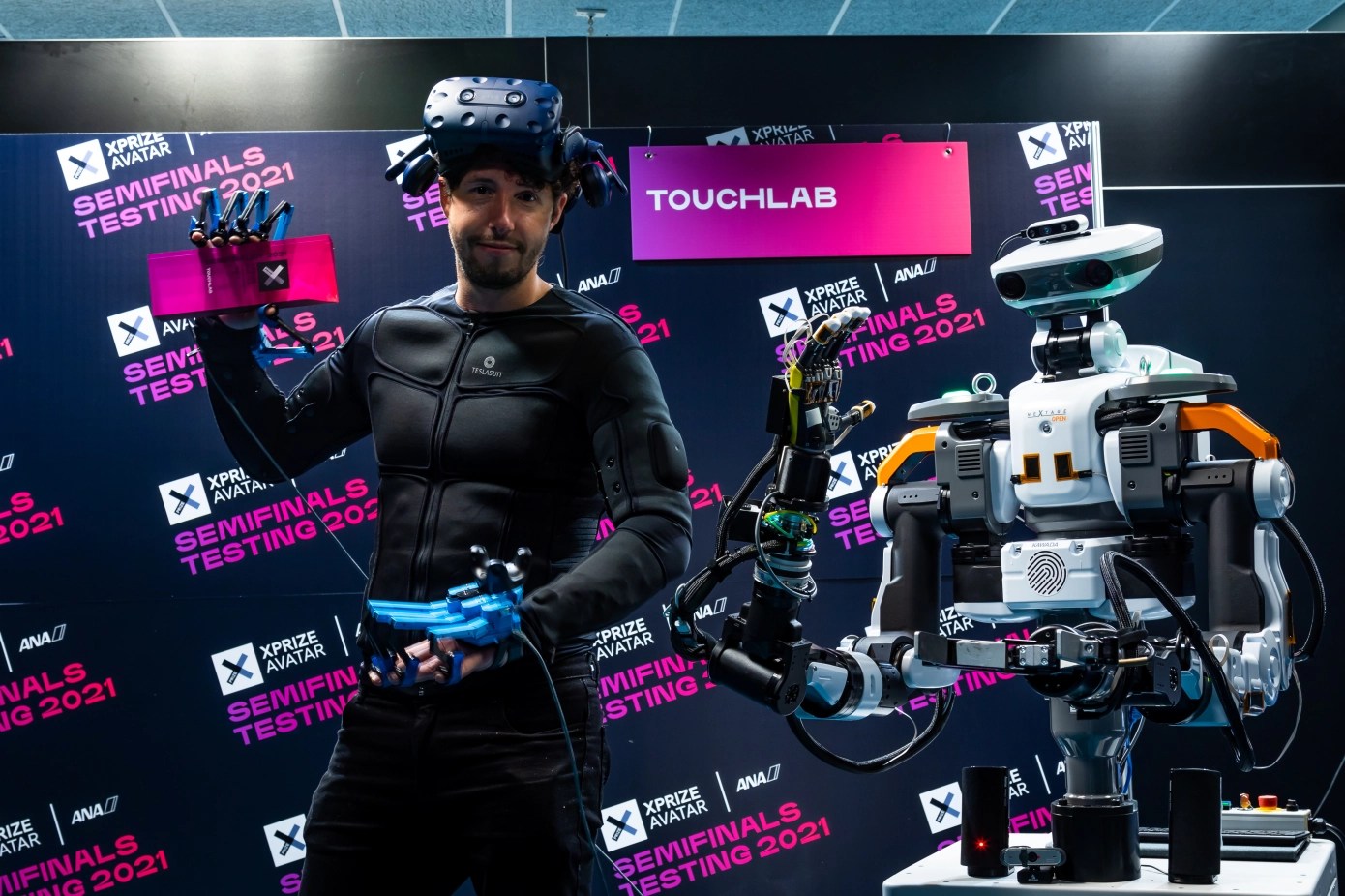
Touchlab was the winner of our TC Sessions: Robotics event back in July, so this thing is long overdue. One bit that’s especially interesting to me is how the company’s outward focus has shifted in that short time. The Edinburg-based firm originally pitched us on its robotic skin. The applications are pretty clear there — effectively adding another layer of sensing to supplement existing vision systems and the like.
That’s still the core of the startup’s play, but Touchlab has also begun to implement its own technology into a robotic system. It showcased an eldercare robot that is essentially an off-the-shelf TIAGo++ robot, outfitted with its sensor technology. Eldercare makes sense, as a highly pressure-sensitive sensor is required to interact with human patients — the elderly in particular.
“We have a layer of software that translates the pressure of the skin to the suit. We’re also using haptic gloves,” co-founder and CEO Zaki Hussein told me. “Currently, our skin gathers a lot more data than we can currently transmit to the user over haptic interfaces. So there’s a little bit of a bottleneck. We can use the full potential of the best haptic interface of the day, but there is a point where the robot is feeling more than the user is able to.”
The haptic sensations are translated into a wearable suit donned by a VR-wearing operator. I’m interested in exploring the state of teleoperation a bit more. There’s a weird sort of stigma around this technology in a category where everyone seems to be constantly chasing full autonomy.
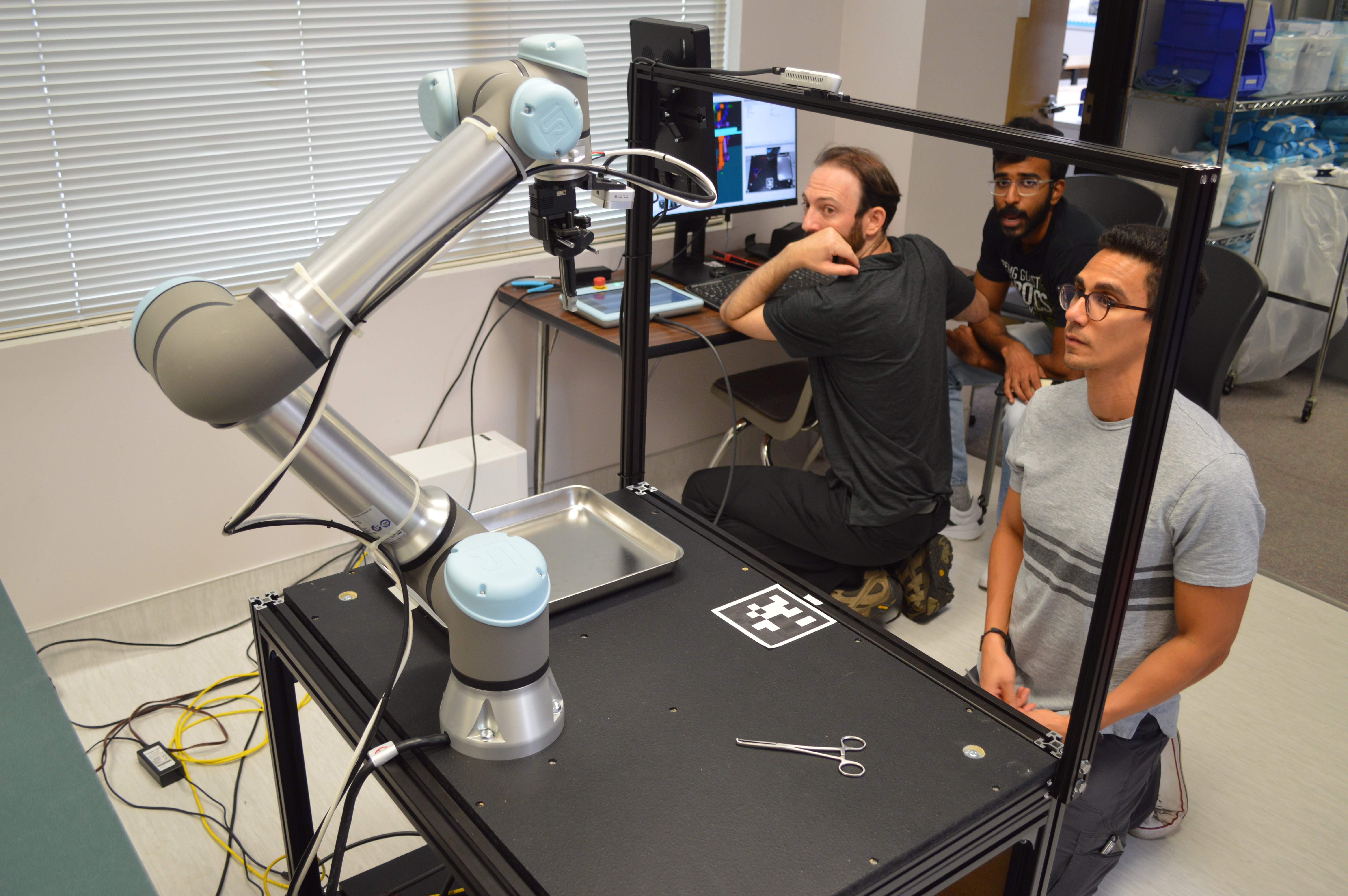
RIF Robotics (pronounced “riff”), another one of the entries in the Battlefield 200, operates in a similar space. Specifically, it’s building systems designed to streamline the disinfecting of medical equipment in-hospital. Co-founder Kevin DeMarco tells TechCrunch:
The major challenges that the sterile processing industry is facing are a lack of experienced surgical technicians, instrument-level tracking, infection traceability and cost traceability. Medical device manufacturers are interested in knowing how their equipment is used and degrades in the field. Instrument-level data will also help them to decide where to send sales reps. Hospitals are interested in instrument-level data because it will help them operate more efficiently by improving instrument-level tracking and instrument inspection. Currently, most hospitals only track at the tray-level, but the industry wants to be able to track at the instrument level.
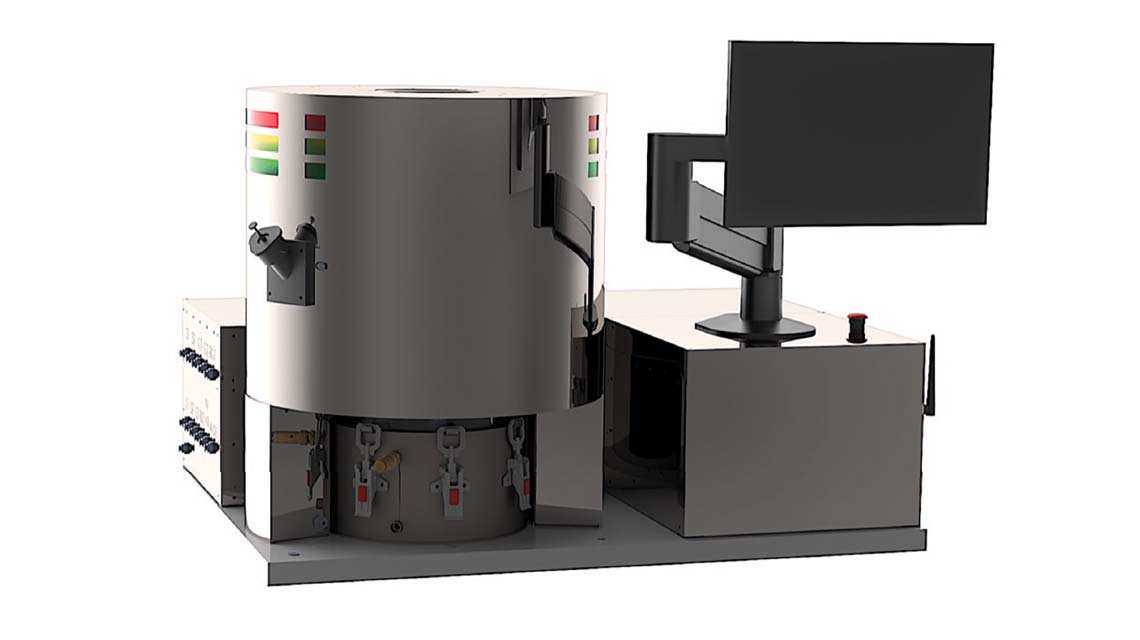
I’m starting to sense a theme emerging here — one more healthcare robotics firm from my time at the Showcase stage. Kyle’s headline really says it all here: “Katakem is developing a robot to automate drug development.” The firm has developed what it deems a “robot chef,” designed to create chemical reactions. It tells TechCrunch:
The production of a chemical product is strictly regulated and standardized. [But] the development phase between discovery and production is still carried out manually and no significant data is extracted. Through data, we can help companies develop new life-saving drugs faster and, of course, this means higher revenues and better margins for them … Data [from OnePot] is reliable, clean and immediately usable.
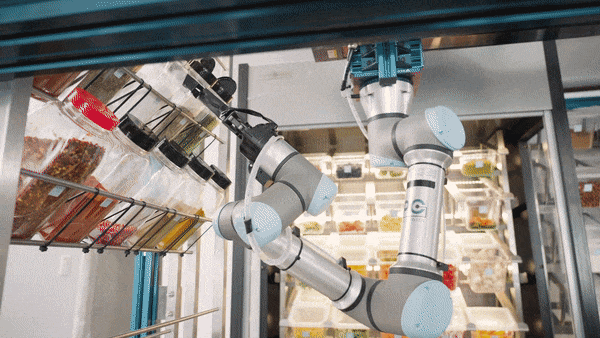
Montreal-based Jasper is taking a unique approach toward a market controlled by the likes of Seamless, DoorDash and Uber Eats. The firm’s play revolves around the deployment of a proprietary chain of automated ghost kitchens designed to dramatically speed up food delivery. The robotics aspect comes in through the kitchen, allowing for minimal or no staff for the food preparation process.
“Having good meals at home is expensive or time consuming … Food delivery is highly inefficient — restaurants or ghost kitchens prepare meals worth a few dollars and then pay someone to ship them across town,” CEO Gunnar Froh told TechCrunch. “While most customers aren’t aware of this, about half of their dollars are spent on platform fees and delivery costs. By running robotic kitchens in or next to residential high-rises, Jasper eliminates labor and delivery inefficiencies to offer residents freshly prepared gourmet meals at the cost of home cooking. Jasper meals are plated on porcelain, which allows its clients to cut up to a third of their household waste.”
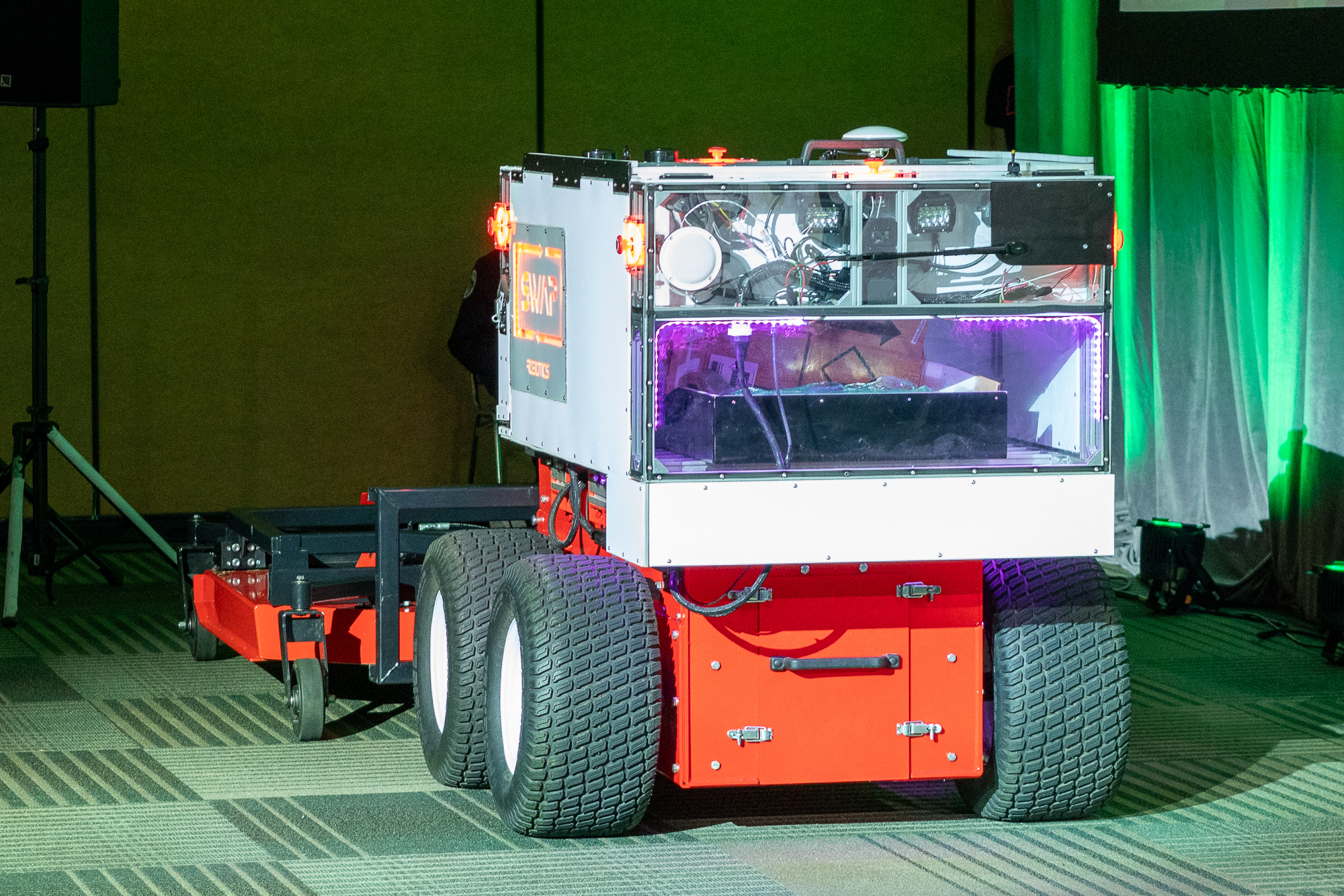
A couple of robotics-focused firms made it onstage for the Battlefield pitch-offs as well. Swap has developed an electric mower specifically designed to cut vegetation around solar farms.
“Right now, there are a couple of main challenges when cutting all of the vegetation in solar fields,” the company tells TechCrunch. “The way it’s done is unsustainable. It’s done by gasoline or diesel-powered equipment, so there’s obviously a big carbon footprint there. There’s also a high cost from gasoline and diesel itself. The equipment is also going through rough terrain, so there’s a lot of equipment breakdown and costs associated with that. Since what we’re doing is 100% electric, it’s a lot more sustainable. There are also way fewer parts, so it’s not going to break down nearly as often.”
One of the more unique features here are the fast-swappable attachments that give the company its name. Within minutes, you can outfit the system with a plow and have it go to town on a bunch of snow. The robotic system is also capable of carrying a payload of up to 1,000 pounds. The robot debuted a few months back, and the company claims that it already has a committed $9 million in contracts to deploy the robots at solar sites.
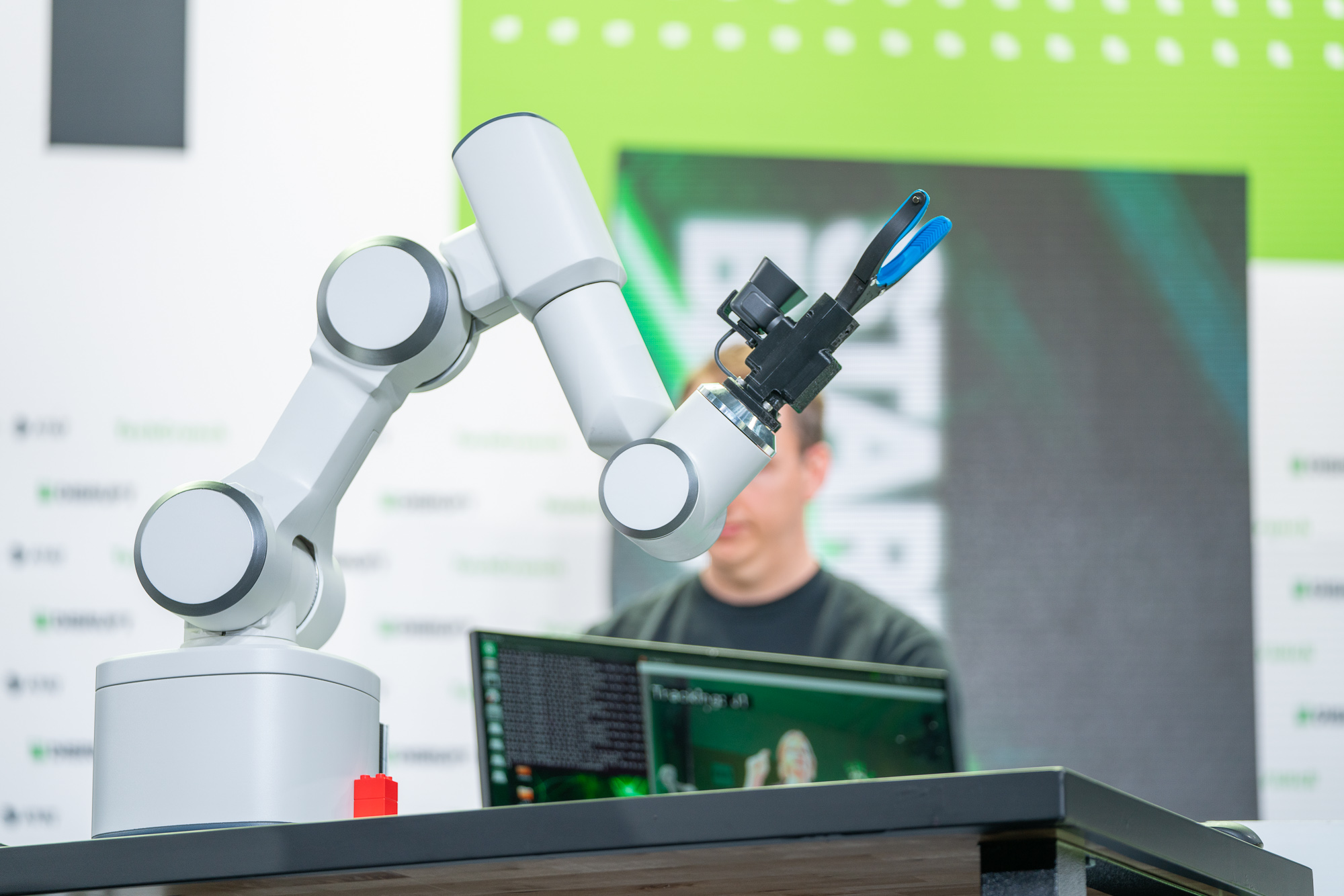
I spoke to Ally recently. The company is attempting to solve an issue that many before it have attempted to tackle (and one we’ve spoken about quite a bit in these column inches): the creation of robotic systems that can be effectively deployed without any robotics or programming expertise.
The company raised $4.7 million in crowdfunding, along with a $6.1 million Series A. Equally impressive, food service automator Miso Robotics signed a $30 million letter of intent to deploy Ally’s robotic arms in kitchens. The company develops both the software and hardware components of its system. It also has a nice little backstory.
“Both my dad and mom had their own business,” Ally Robotics founder and CEO Mitch Tolson tells TechCrunch. “My mom had a sign company. Every single weekend and nights during the week, I was installing neon signs, welding up frames, digging trenches, holes for electrical, all of it.”
I think that’s all of the Disrupt-related content I’ve got for you this week, but here are some quick news stories from the week. Go!
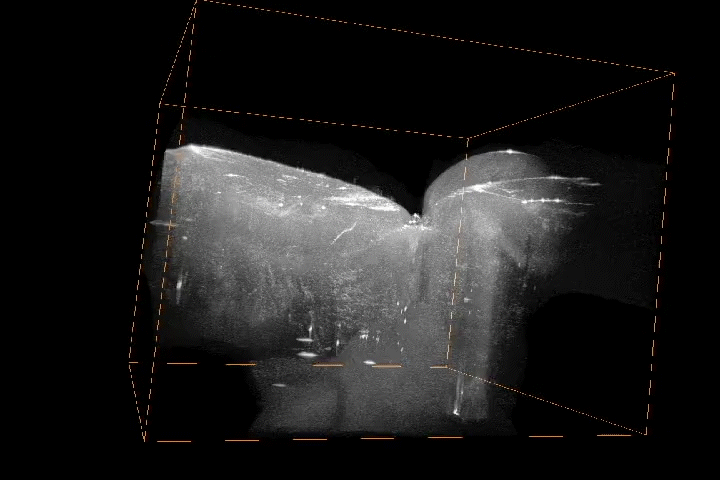
I (very squeamishly) wrote about Cyberdontics’ $15 million raise. The idea of having a robot operating in my mouth isn’t one that I (world-famous dental not liker) am particularly psyched about, but I also don’t hate the idea of reducing the hours it takes to get a procedure like a root canal or crown down to a matter of minutes.
“If you’ve had something like a root canal, a crown or any of these types of procedures, where you’re spending an hour or two in the dentist’s chair and you’re spending multiple trips to go back and get it fixed,” CEO Chris Ciriello told me, “the idea that you can literally have this robot in your mouth for under one minute and you can be out the door 15 minutes later is a game changer. For people that really don’t like the dentist, this is a really attractive way to get in and out a lot faster.”
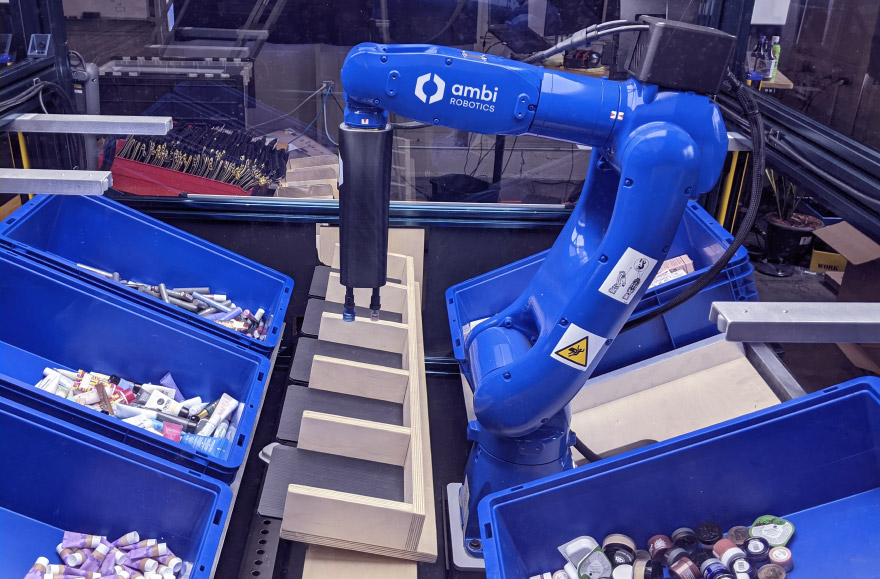
Kyle’s got a piece on Ambi Robotics’ $32 million funding round. The company is one of a growing army of firms competing to automate fulfillment centers and warehouses. It recently signed a $23 million deal to bring its systems to Pitney Bowes’ U.S.-based fulfillment centers.

Something fun to close out this week’s newsletter. I did a quick post early this week about researchers who programmed MIT’s Mini Cheetah quadruped robots to play soccer goalie. It’s an extremely tough thing to accomplish: teaching a robot to map a projectile’s path, react, and move its body in under one second. The paper notes:
Soccer goalkeeping using quadrupeds is a challenging problem that combines highly dynamic locomotion with precise and fast non-prehensile object (ball) manipulation. The robot needs to react to and intercept a potentially flying ball using dynamic locomotion maneuvers in a very short amount of time, usually less than one second. In this paper, we propose to address this problem using a hierarchical model-free RL framework.

The best defense is a good offense. Sign up for Actuator today.































Comment